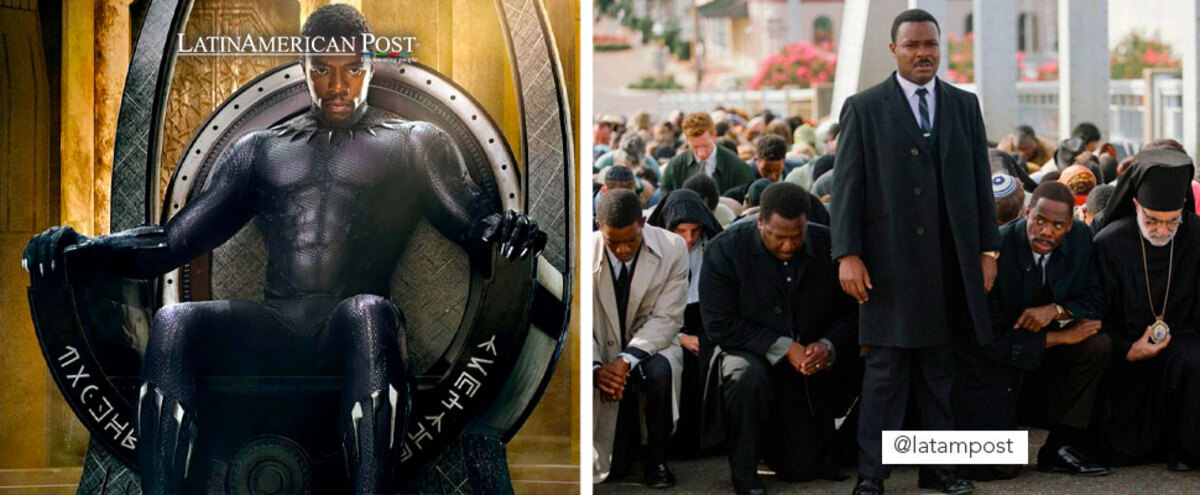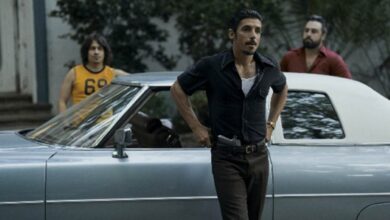Black History Month: 6 Movies You Must See
During February, Black History Month is celebrated to vindicate the history of those who have been ignored many times. We recommend these six films for you to join the celebration.

Photos: Marvel Entertainment, Apple TV
LatinAmerican Post | Staff
Listen to this article
Leer en español: Mes de la Historia Negra: 6 películas que debes ver
Black History Month is celebrated in the United States and Canada in February. This initiative was born in the 70s by a group of black educators in Kent, Ohio. The idea would be to dedicate one month of the year to the history of the black race, the African diaspora, and its role, usually forgotten and ignored, in the history of the United States in the curriculum of public schools. This claim in public education is still celebrated today, and in other countries such as the United Kingdom, the Republic of Ireland, and the Netherlands, it takes place in October.
Although Black History Month is official only in these five countries, you don't have to be from any of them to celebrate it. That is why, to join the claim of black history and to understand the racism of our days better, we recommend these six films of this century to see in Black History Month. We know this is a recurring theme in cinema history today, so we have chosen films of a varied genre that seem reasonable to us and move away from the common point.
"Dgango Unchained", Quentin Tarantino (2012)
Tarantino is well known for his films in the historical fiction genre. More than once, he has taken historical events, put them on the screen, and told them as he wanted. He had done it before, in 2009, with "Inglorious Basterds," which took place during World War II, and imagined the assassination of Hitler by a young Jewish woman and a black man. In 2012, then, he released "Django Unchained," in which he reimagined the story of a black man during slavery. Far from wanting to be pedagogical, "Django" scrutinizes the nature of racism while parodying it, which brings out laughter and satisfaction as we witnessed the revenge of a black man when this was not possible.
"Selma," Ava DuVernay (2014)
This is more pedagogical, and it is perhaps that many college students will see it to learn about the fight for civil rights in the United States. Closer to the story, "Selma" follows the marches led by Martin Luther King Jr, James Bevel, and Hosca Williams for voting rights in Selma, Alabama, in 1965. In addition to being well told, this film not only accounts for racial injustices during the 1960s but also has an interest in telling how what has been won so far has been won. Ava Duvernay, its director, is also the director of the documentary "Amendment XIII," which studies racism in American justice and its relationship with modern slavery. It is available on Netflix.
"Moonlight", Barry Jenkins (2016)
An Oscar winner in the year of its release, "Moonlight" is perhaps the most beautifully shot on our list. It is based on the play "In Moonlight Black Boys Look Blue" and is told in three acts where we see Chiron, its protagonist, grow up. The three acts correspond to his childhood, adolescence, and adulthood in a suburb of Miami. Of course, Chiron's experiences are crossed by the racism and homophobia of his social context. And nevertheless, to describe "Moonlight" like this would be an understatement since its genre is not denunciation but instead covers larger and, ultimately, human themes, such as love, fraternity, friendship, cruelty, and kindness.
Read also: Review of "Ant-Man and the Wasp: Quantumania": The curtain opens on the new era of Marvel
"Hidden Figures", Theodore Melfi (2016)
This is another one that sticks to the facts. Although its formal proposal is not innovative and is instead a film that follows the formulas of its genre, we have decided to include it because if some have been made invisible in American history, it has been black women. Many are familiar with the male figures in America's racial struggle. The names Martin Luther King Jr. and Malcolm X were familiar to all. And yet women still need to figure in the history books today. The protagonists of this film, moreover, were doing their job. It is about the team of black scientists, physicists, and mathematicians who played a fundamental role in the arrival of man on the moon in 1969, with which the United States won the space race against Russia during the Cold War. So beyond claiming these women's names, this film and the book on which it is based make it clear how black women have been relevant to the most critical events in American history.
"BlacKkKlansman", Spike Lee (2018)
Director Spike Lee must be included in this list. He has been perhaps the director who has vindicated African-American history the most and explored the issue of racism the most in his films. Since this list is of movies from the last two decades, we recommend this one. However, Spike Lee's filmography has much more than romance, comedy, drama, and true story. "BlacKkKlansman" is the only other comedy on our list, and it's also fictional. A black police officer infiltrates the Ku Klux Klan by impersonating a white man in Colorado Springs, El Paso. This story deals with justice and dares to touch on other forms of discrimination in the United States, albeit superficially.
"Black Panther", Ryan Coogler (2018)
Regarding the recent theatrical release of its sequel, "Wakanda Forever," we recommend the MCU movie about Black Panther. This is nothing more than a forced effort by Marvel studios to make their films more inclusive. Maybe that's the case, but "Black Panther" has turned out very well. To begin with, the name of Marvel's first leading black superhero clearly references the movement of the black panthers, which was active in the United States from the 1960s to the 1980s. The film also takes place in the fictional kingdom of Wakanda. And gets rid of any pretense of "Americanizing" its protagonists. It also explicitly references the African diaspora, if not victimizing its protagonists, who have different ideas of what the kingdom of Wakanda must do to save itself and the world.
Its sequel, "Wakanda Forever," comes as a tribute after the death of Chadwick Boseman, who played the Black Panther. "Wakanda Forever" is among the few films that have passed a test that evaluates the representation of black women in the cinema. The criteria are simple: scenes in which two women of color have a conversation of more than three minutes that is not about a man. It's absurd that most movies fail to pass this simple filter, but it also shows how vital representation on screens is.
Thus, represented in independent films, but now also in high-budget ones, in box offices, African-Americans claim their history. At the movies and in schools: Happy Black History Month.




